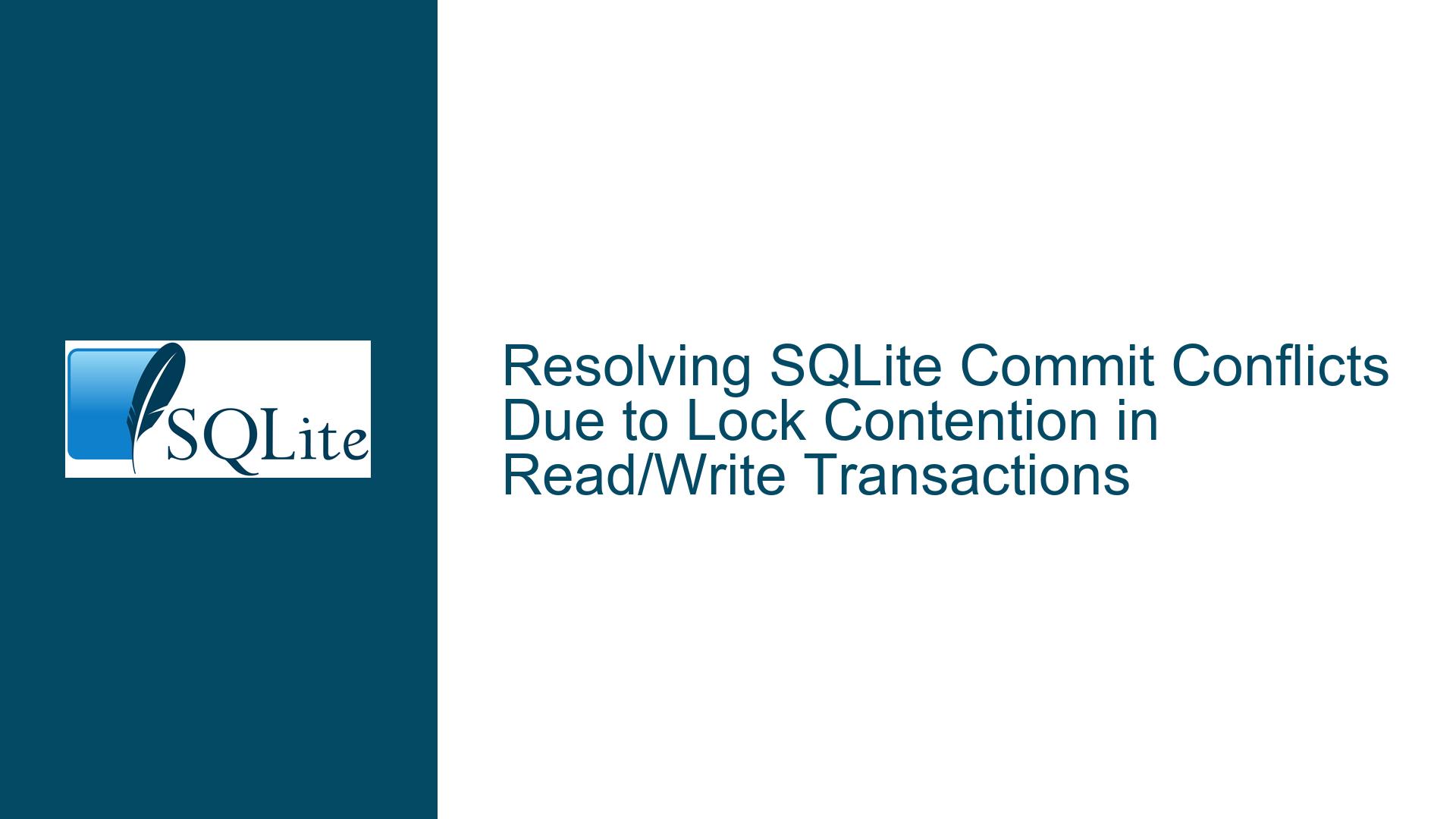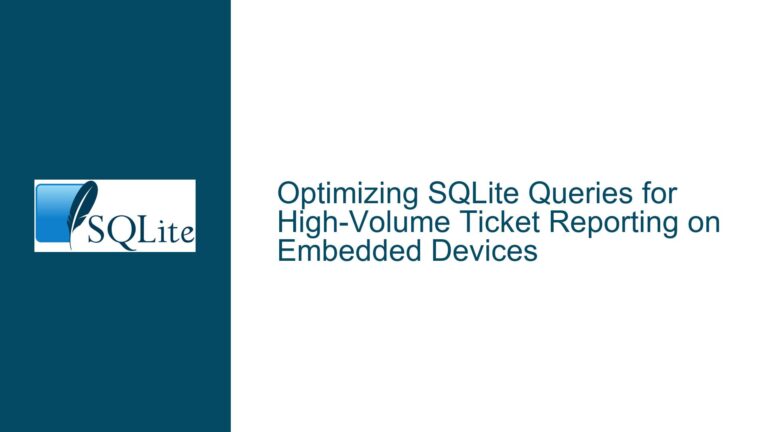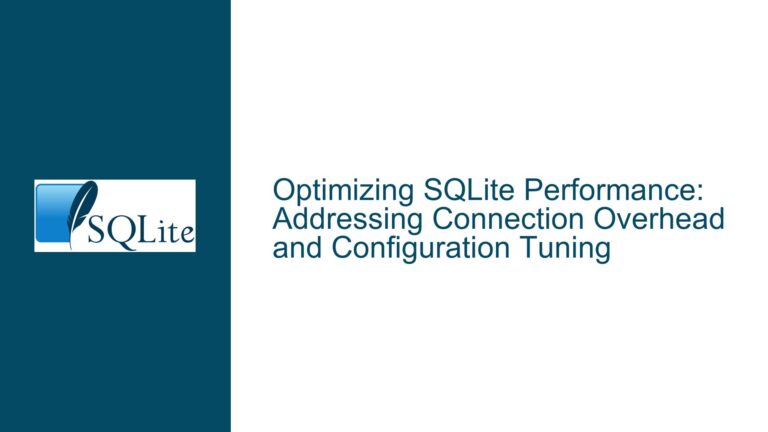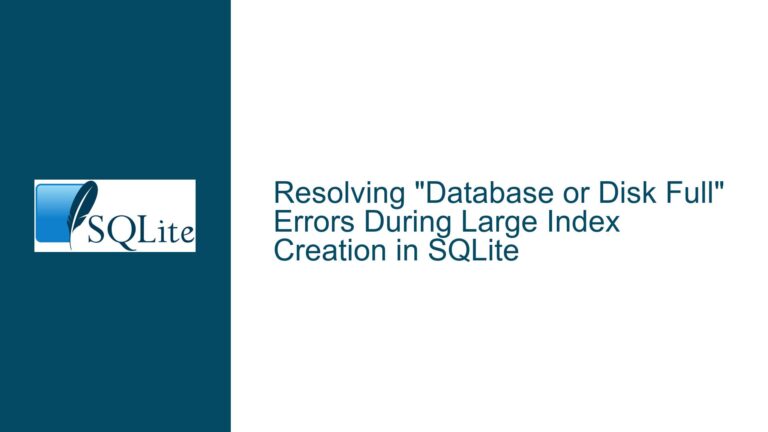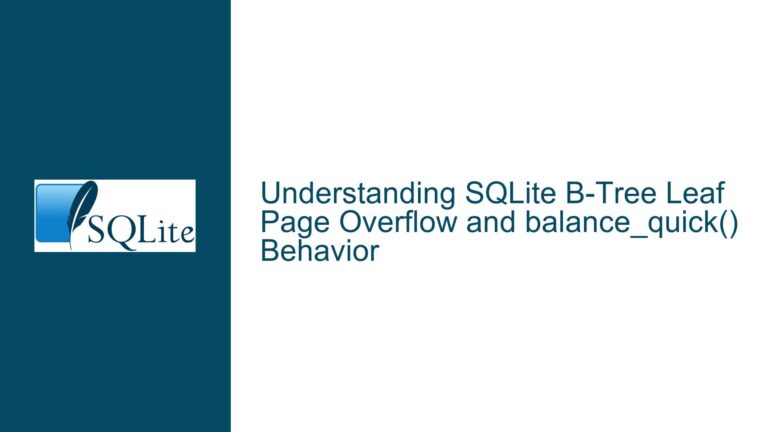Resolving SQLite Commit Conflicts Due to Lock Contention in Read/Write Transactions
Understanding SQLite Transaction Locking States and Commit Behavior
SQLite manages concurrent access to databases through a locking mechanism that ensures transactional integrity while balancing performance. A common challenge arises when simultaneous read and write operations attempt to interact with the database, leading to commit failures or unexpected blocking. This guide explores the mechanics of SQLite’s lock escalation process, the conditions under which COMMIT operations succeed or fail, and practical strategies to resolve contention.
Lock States and Transaction Lifecycle
SQLite employs five primary lock states: UNLOCKED, SHARED, RESERVED, PENDING, and EXCLUSIVE. These states dictate how transactions interact with the database:
- SHARED: Acquired by read operations (e.g.,
SELECT). Multiple connections can hold SHARED locks simultaneously. - RESERVED: Obtained by a write transaction (via
BEGIN IMMEDIATEor the first write operation in a deferred transaction). A RESERVED lock signals intent to modify the database but allows other SHARED locks to coexist. - PENDING: A transitional state indicating a write transaction is ready to commit. While PENDING is active, new SHARED locks are blocked, but existing SHARED locks remain until released.
- EXCLUSIVE: Required to write changes to the database file. Only one EXCLUSIVE lock can exist at a time, and it is acquired after all SHARED locks are relinquished.
A write transaction progresses through these states:
- Starts in SHARED mode (default for
BEGIN DEFERRED). - Escalates to RESERVED upon the first write operation (or explicitly via
BEGIN IMMEDIATE). - Upgrades to PENDING when the transaction is ready to commit.
- Finally, acquires EXCLUSIVE to finalize changes on disk.
Commit Mechanics and Contention Points
The COMMIT command attempts to finalize a transaction by advancing through PENDING to EXCLUSIVE. However, this process can fail if:
- Other connections hold SHARED locks (preventing EXCLUSIVE acquisition).
- The same connection has pending write operations (e.g., incomplete
INSERT,UPDATE, orDELETEstatements).
A critical distinction exists between pending statements (prepared but not fully executed/reset) and active locks. For example, a SELECT statement that has been partially stepped through (via sqlite3_step()) but not finalized retains a SHARED lock, blocking a writer’s transition to EXCLUSIVE. Conversely, pending write operations within the same connection (e.g., an UPDATE that hasn’t completed) will cause COMMIT to return SQLITE_BUSY, as SQLite cannot finalize a transaction with active modifications.
WAL Mode vs. Rollback Journal Behavior
The locking model differs significantly in Write-Ahead Logging (WAL) mode. In WAL:
- Readers do not block writers, and writers do not block readers.
- EXCLUSIVE locks are not required for commits, reducing contention.
- Commit conflicts arise only when multiple writers attempt simultaneous modifications.
In contrast, traditional rollback journal mode (the default) requires strict lock escalation, making it prone to contention between readers and writers.
Common Causes of Commit Failures and Lock Contention
1. Unfinalized Read Operations Blocking EXCLUSIVE Locks
A connection holding a SHARED lock (e.g., an open read transaction) prevents a writer from acquiring an EXCLUSIVE lock. This occurs even if the reader is not actively executing a query but has not yet finalized its transaction. For example:
sqlite3_prepare_v2(db, "SELECT * FROM table;", -1, &stmt, NULL);
sqlite3_step(stmt); // Acquires SHARED lock
// ... but does not call sqlite3_finalize(stmt) or sqlite3_reset(stmt)
The SHARED lock persists until the statement is reset or finalized, blocking concurrent write transactions.
2. Pending Write Operations in the Same Connection
A write transaction cannot commit if it has active write statements. For instance:
sqlite3_exec(db, "BEGIN IMMEDIATE;", NULL, NULL, NULL);
sqlite3_exec(db, "INSERT INTO table VALUES (1);", NULL, NULL, NULL); // RESERVED acquired
sqlite3_exec(db, "COMMIT;", NULL, NULL, NULL); // Fails if INSERT is pending
Here, the COMMIT fails if the INSERT has not been fully executed (e.g., due to interruption or improper statement handling).
3. Writer Starvation in High-Concurrency Environments
A writer holding a RESERVED lock allows new SHARED locks to be acquired, which can lead to starvation. When the writer upgrades to PENDING, new SHARED locks are blocked, but existing ones must complete before EXCLUSIVE is granted. In high-concurrency scenarios, continuous SHARED lock requests can indefinitely delay the writer.
4. Transaction Cache Spills Forcing Early EXCLUSIVE Locks
When a write transaction exceeds SQLite’s cache capacity (controlled by cache_size), it spills to disk, requiring an early EXCLUSIVE lock. This prolongs the duration of EXCLUSIVE ownership, increasing contention.
5. WAL Mode Misconfiguration
Using WAL mode without adjusting wal_autocheckpoint or wal_size can lead to uncontrolled WAL file growth or checkpoint contention. While WAL reduces lock conflicts, improper configuration introduces new bottlenecks.
Resolving Lock Contention and Ensuring Successful Commits
1. Finalize or Reset All Statements Promptly
Ensure all prepared statements are finalized (sqlite3_finalize()) or reset (sqlite3_reset()) immediately after use. This releases SHARED locks and prevents them from blocking writers:
sqlite3_stmt* stmt;
sqlite3_prepare_v2(db, "SELECT * FROM table;", -1, &stmt, NULL);
while (sqlite3_step(stmt) == SQLITE_ROW) {
// Process row
}
sqlite3_reset(stmt); // Release SHARED lock
sqlite3_finalize(stmt);
2. Use BEGIN IMMEDIATE for Write Transactions
Explicitly start write transactions with BEGIN IMMEDIATE to acquire a RESERVED lock early. This signals intent to write and reduces the window for contention:
BEGIN IMMEDIATE;
-- Perform writes
COMMIT;
3. Handle SQLITE_BUSY Errors Gracefully
Implement retry logic with exponential backoff when COMMIT returns SQLITE_BUSY:
int retries = 0;
while (sqlite3_exec(db, "COMMIT;", NULL, NULL, NULL) == SQLITE_BUSY) {
if (retries++ > MAX_RETRIES) break;
usleep(1000 * (1 << retries)); // Exponential backoff
}
4. Monitor and Limit Long-Running Queries
Use the sqlite3_progress_handler() API to interrupt long-running queries that may hold SHARED locks indefinitely. Configure timeouts using sqlite3_busy_timeout() to avoid deadlocks:
sqlite3_busy_timeout(db, 5000); // 5-second timeout
5. Adopt WAL Mode for Read/Write Concurrency
Enable WAL mode to decouple readers from writers:
PRAGMA journal_mode=WAL;
Adjust WAL settings to balance performance and storage:
PRAGMA wal_autocheckpoint=1000; // Checkpoint after 1000 pages
PRAGMA wal_size=4096; // Set WAL size to 4MB
6. Avoid Transaction Cache Spills
Increase cache_size to reduce spills and minimize EXCLUSIVE lock duration:
PRAGMA cache_size=-10000; // 10MB cache
7. Isolate Write Transactions in High-Contention Scenarios
For critical write operations, use BEGIN EXCLUSIVE to immediately acquire an EXCLUSIVE lock, bypassing RESERVED/PENDING escalation. This is suitable for batch operations where concurrency is less important:
BEGIN EXCLUSIVE;
-- Perform writes
COMMIT;
By systematically addressing lock states, finalizing operations, and leveraging WAL mode, developers can mitigate commit conflicts and ensure reliable transaction handling in SQLite.
